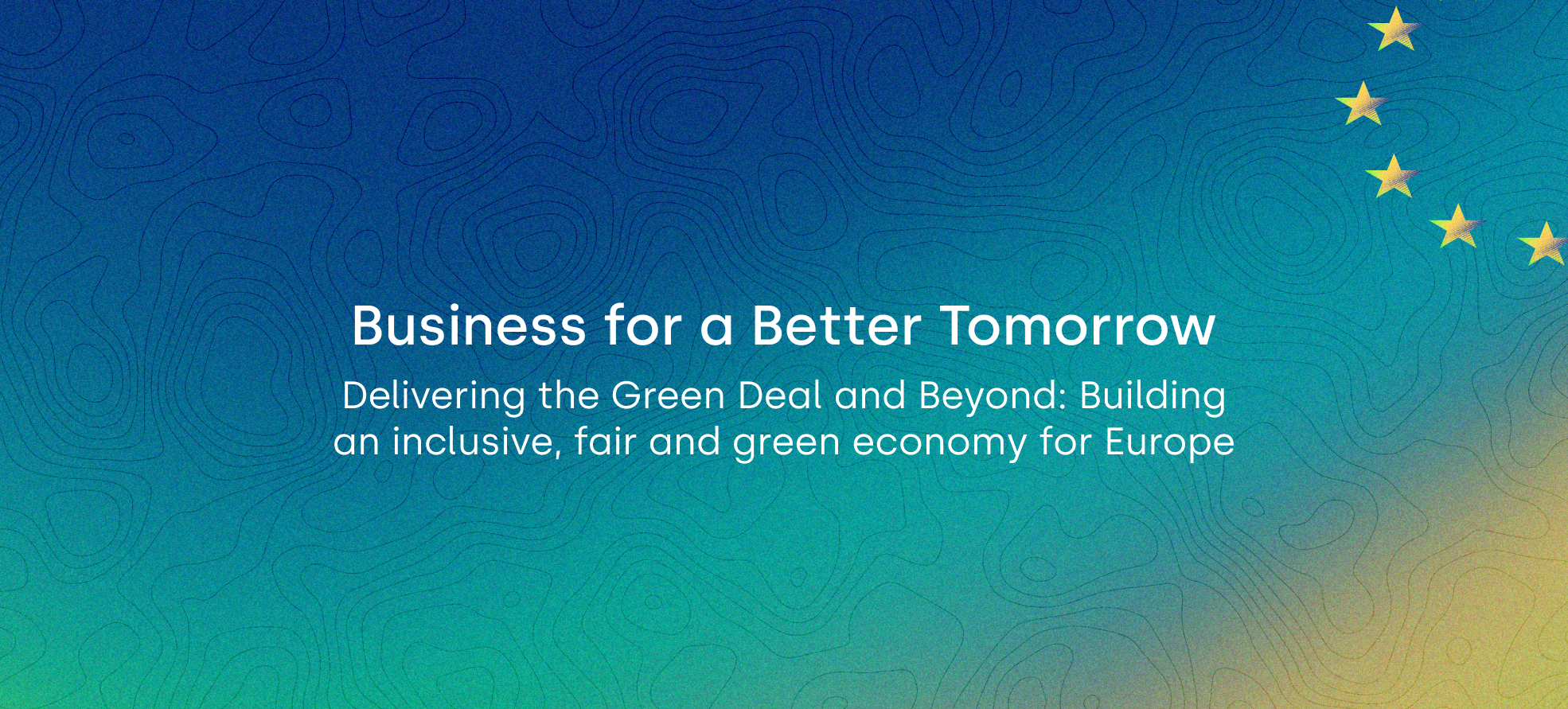-
-
Building a more inclusive, fairer and greener economy in Europe
The transition will either work with businesses or it won't. In the face of social crisis and environmental challenges, businesses have a key role to play, which is also responding to a growing demand driven by consumers, employees and even investors, all now paying attention to the sustainability of business models and the positive impact of businesses on society. However, today we can only see how far we still have to go to align the entire European economy with our sustainability goals.
Yet, some parts of our economy offer strong reasons to hope. Across the continent, tens of thousands of businesses, diverse yet complementary in their business models, are already making a positive contribution to the European Union's major transition objectives. These pioneering companies greatly vary in size and operate in all sectors of the economy. They all share the ambition of combining economic performance with a positive impact on society. They are innovating across the value chain, favouring circularity and short circuits, promoting sobriety and sustainable technologies, and putting equity and inclusiveness at the heart of their organisational models. By their very nature, they help to create a fairer, more inclusive economy that respects the planet's limits.
However, these companies still face an economic system with perverse incentives that favours the most harmful business models and practices - carbon emissions, over-consumption of resources, disregard for social and human rights, biodiversity collapse, soil pollution, etc. This system today favours relocation of production and the exploitation of social misery to the detriment of environmental protection and quality jobs in Europe. This system also favours overproduction and overconsumption of low-quality products to the detriment of Made in Europe, the circular economy and short supply chains, and our objectives of sobriety and sustainable development. Our economic rules are obsolete and steer our economy away from our major sustainability goals.
While the system today weakens these pioneering businesses, we plead for incentives and legislation that will champion pioneering businesses and encourage the entire European economic fabric to evolve towards more sustainable and inclusive business models.
Unfortunately, the context is worrying and does not seem to be moving in the direction of a paradigm shift. The European Union (EU) undergoes a sharp economic slowdown and struggles to achieve its climate, circular economy and biodiversity targets, while the Green Deal, which initiated the transition of the European economy, is now being progressively called into question for purely political reasons in response to pressure from lagging industries and traditional business lobbies.
Finally, and to make matters worse, the likely rise of the far right in the European elections represents a potential major threat to progressive initiatives such as the Green Deal, which is already encountering significant resistance.
The need to continue the transition - and therefore not to give up on the momentum of the Green Deal - is crucial in more ways than one.
Giving up would endanger the development of impact-led companies, and therefore the prosperity of this economy for the common good.
Giving up would jeopardise our progress towards the EU's sustainability objectives: Europe would then further fall behind in its transition to a more inclusive, fairer and greener economy.
Giving up would finally favour a business-as-usual approach that relies on old economic models that have proven vulnerable in recent crises; on the opposite the Green Deal would usher in a new model that would be resource-efficient, autonomous, maintaining social cohesion and eventually also protect companies against potential downturns.
International competition demands a new model of fair economic performance that supports the European social model. To avoid the decline of the European economy, we must prioritise companies that contribute to the common good, making them the keystones of an economy that is more focused on environmental and social impact.
Time has come for a new economy in which positive impact is no longer seen as a burden but as an asset for European businesses. This is the only way to restore both the sovereignty and the resilience of the European Union, while ensuring businesses meet the critical challenges of our time.
-
Signatories
- Caroline Neyron, Director of Mouvement Impact France
- Emery Jacquillat, Co-founder and Head of European Development of Communauté des Entreprises à Mission, President of CAMIF
- Arthur ten Wolde, Executive Director of Ecopreneur.eu, the European Sustainable Business Federation
- Stefan Panhuijsen, Director of Social Enterprise NL, the Dutch national network organisation for social enterprises
- Benoît Quittre, President of Kaya - Belgian Coalition of Ecopreneurs
- Viktorija Braziunaite, Director of the Lithuanian Social Business Association
- Wieteke Dupain, CEO, Euclid Network - the European Social Enterprise Network
- Toby Gazeley, Policy Lead, Euclid Network - the European Social Enterprise Network
- Yvonne Zwick, Chairwoman of the Executive Board of B.A.U.M e.V - Network for Sustainable Business
- Iara Beekma Reis, Head of Advocacy and Stakeholder Management of New ERA (New European Reuse Alliance)
- Daniela Pavlova, Director of SANNAS Asociación de Empresas Triple Balance
- Victoria Carreras, President of SANNAS, Asociación de Empresas Triple Balance
- Carlos Cordero, Director of Sustentia, Member of the Board of SANNAS
- Yvonne Jamal, Co-founder and Chairwoman of JARO Institute for sustainability and Digitalization
- Frédéric Benhaim, President of Entreprendre Vert
- Elsa Da Costa, Director of Ashoka France
- Mauro Del Barba, President of Assobenefit
-


